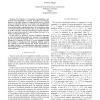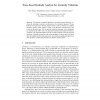751 search results - page 13 / 151 » Large Event Traces in Parallel Performance Analysis |
109
click to vote
ISCA
1992
IEEE
15 years 5 months ago
1992
IEEE
A quantitative analysis of program execution is essential to the computer architecture design process. With the current trend in architecture of enhancing the performance of unipr...
TACAS
2009
Springer
15 years 8 months ago
2009
Springer
Analysis of execution traces plays a fundamental role in many program analysis approaches. Execution traces are frequently parametric, i.e., they contain events with parameter bind...
IEEECIT
2010
IEEE
14 years 11 months ago
2010
IEEE
—The relevance of instruction parallelization and optimal event scheduling is currently increasing. In particular, because of the high amount of computational power available tod...
147
Voted
TACAS
2010
Springer
15 years 8 months ago
2010
Springer
Abstract. We propose a symbolic algorithm to accurately predict atomicity violations by analyzing a concrete execution trace of a concurrent program. We use both the execution trac...
102
click to vote
HASKELL
2009
ACM
15 years 7 months ago
2009
ACM
Parallel Haskell programming has entered the mainstream with support now included in GHC for multiple parallel programming models, along with multicore execution support in the ru...


